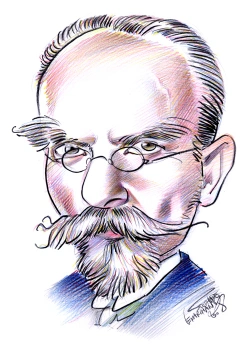HUSSERL, EDMUND
Publié le 22/02/2012

Extrait du document

HUSSERL, EDMUND (1859–1938), philosopher; devised phenomenology,
a method of probing beneath external existence to a positive perception of fundamental
essence. Born of Jewish parentage in the Habsburg city of Prossnitz,
he studied mathematics at Berlin* and psychology at Vienna and taught at Halle,
Go¨ttingen, and Freiburg (from 1916). His circle of skilled students was such
that when he was called in 1923 to succeed Ernst Troeltsch* at Berlin, he chose
to remain at Freiburg.
Because philosophy was for Husserl a science, he was convinced that it encompassed
objective truths. Although his 1901 work Logische Untersuchungen
(Logical investigations) pronounced philosophy an a priori discipline, his 1913
Ideen zu einer reinen Pha¨nomenologie und pha¨nomenologischen Philosophie
(Ideas about a pure phenomenology and phenomenological philosophy) provided
a program for investigating consciousness and its objects by suspending belief
in the empirical world as a means of gaining a vantage point in subjective
consciousness. The methodology inspired philosophers in the United States and Germany, notably Martin Heidegger* (who succeeded Husserl in 1928), and
laid a foundation for Gestalt psychology. It was the methodology, as opposed
to any incontestable philosophical truths, that established Husserl's importance.
When he retired, he had published eight books or long articles; he also had
45,000 pages of manuscript in shorthand. None of his work laid claim to being
definitive, for he enjoyed characterizing himself as ‘‘a perpetual beginner.''
Although his family had converted to Protestantism in 1866, Husserl was
deprived of his professorial title in 1933. He was reinstated when records revealed
that his son had fallen honorably in World War I, but the title was again
withheld in 1936. He remained in Freiburg until his death, but was increasingly
subjected to social indignities.
Liens utiles
- RECHERCHES LOGIQUES, Logische Untersu- chungen, 1900-1901. Edmund Husserl
- LOGIQUE FORMELLE ET LOGIQUE TRANSCENDANTALE, Edmund Husserl
- LEÇONS POUR UNE PHÉNOMÉNOLOGIE DE LA CONSCIENCE INTIME DU TEMPS, Edmund Husserl
- RECHERCHES LOGIQUES d’Edmund Husserl (Résumé et analyse)
- CRISE DES SCIENCES EUROPÉENNES ET LA PHÉNOMÉNOLOGIE TRANSCENDANTALE (LA), Edmund Husserl








